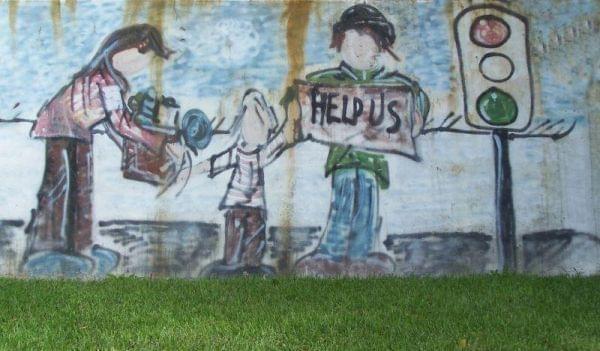Illinois Issues: No Place To Call Home

An estimated 13,054 Chicago families experienced homelessness during the 2014-15 school year, according to the Chicago Coalition for the Homeless, Valerie Everett
Tristian Ellis’ test scores in reading and math dropped dramatically this fall from last. The difference: the Ellis family had its own apartment last year. Now, the family of four stays in a shelter on Chicago’s far north side.
For the 8-year-old student, who attends LEARN Excel Charter on the city’s northwest side, distractions abound. His mother, Latoya Ellis, lost her job in August and moved into the shelter a month later. She describes being homeless as “a very devastating experience,’’ which is particularly hard on Tristian, her youngest child.
Of the shelter, she says, “It’s a big open space, and there’s always things going on. There’s nowhere private or quiet for the children to focus on their studies, especially with my son because he’s still very young. If he sees five other kids running around and playing, he’s very distracted. He wants to run around and play as well.”
Add to that a list of problems that includes poor sleep, unbalanced meals and an hour-plus commute from the shelter to school on a train and a bus.
Recognizing the effect lack of permanent housing has on academic performance, those who work with the homeless in Chicago are making the case that the most important thing students need to succeed at school is a place to call home. They have called on the city to expand housing vouchers for 500 families.
An estimated 13,054 Chicago families experienced homelessness during the 2014-15 school year, according to the Chicago Coalition for the Homeless, which reports that fewer than 125 of those families find permanent affordable housing each year. There are about 22,000 homeless students in the district, which has 400,000 students in 600 schools.
The coalition issued a report yesterday calling for the creation of programs to help Chicago Public Schools students and their families find housing. “There’s a lot of research already out there about the negative impact of residential mobility on education.… It has a big impact on kids and their ability to learn,’’ says Julie Dworkin, director of advocacy for the coalition.
“There’s also research about the opposite of that — that kids in stable housing, affordable housing, do better, and there’s lots of models around the country where the housing programs were really partnering with schools to identify families that need to be stabilized. It also helps the schools. The kids moving around is very disruptive to the school.’”
That report also calls for greater emphasis on homeless families — like the attention given to homeless veterans by the city of Chicago — and more funding being directed toward finding families housing.
In addition to the calls for new programs, the coalition also surveyed 118 families without homes. From that survey, the group collected information about the consequences of homelessness on students’ school behavior, which included sleeping in class, being withdrawn, being disruptive in class, getting into fights and receiving more discipline, including suspensions.
“How do you concentrate on your school work when you don’t know where you’re going to get off the school bus that night?’’ asks Spencer Cowan, senior vice president of research for the Chicago-based Woodstock Institute.
Dworkin says the coalition is asking the Chicago Board of Education to update its policies on homeless students. “We want them to make sure that everybody is trained on that policy and doing everything that they’re supposed to be doing. We want to see more liaisons in schools.”
The report also calls for having the coalition partner with CPS to train staff “on sensitive and comprehensive identification of homeless students, including unaccompanied homeless youth.” It says Chicago Public Schools should “provide students who are homeless with rights and services, including immediate enrollment, transportation, fee waivers, tutoring, uniforms and dispute resolution.” And the coalition advocates for the school system to improve attendance rate, graduation rate and academic performance of homeless students.
“The Chicago Coalition, in sentiment and direction, in my view, is heading in the right direction,” says Dr. Ellen Bassuk, president of the Boston-based Bassuk Center on Homeless and Vulnerable Youth. She says the recommendations share an outlook with her recent report on how to end family homelessness.
Emily Bittner, director of communications for CPS schools, offered a written statement on this story after its release: "Chicago Public Schools is committed to providing students and families with the supports they need to access a high quality education, and our STLS (Students in Temporary Living Situations) program is designed to ensure that students without stable housing are receiving the services and supports necessary they need to be successful in school.”
Each school has a liaison for homeless students and the district waives fees for those in the STLS program, Bittner said.
Illinois Issues is in-depth reporting and analysis that takes you beyond the headlines to provide a deeper understanding of our state. Illinois Issues is produced by NPR Illinois in Springfield. This story is part of a series on homelessness. Click here to read the second installment, which focuses on rural homelessness.
Links
- A Nation in Denial: The Truth About Homelessness
- Community Services Are in Short Supply for Champaign’s Homeless This Winter
- Totals In Homeless Survey Slightly Up, But More Finding Shelter
- With A Series Of Small Bans, Cities Turn Homelessness Into A Crime
- Homeless Try To Stay Warm, Together
- Champaign Parking Meters Installed To Help Homeless
- Closed Decatur Corrections Facility To Become Homeless Shelter
- Homelessness a Concern in C-U
- Illinois Schools Serving More Poor, Homeless Students
- No Place To Call Home - Part 2
